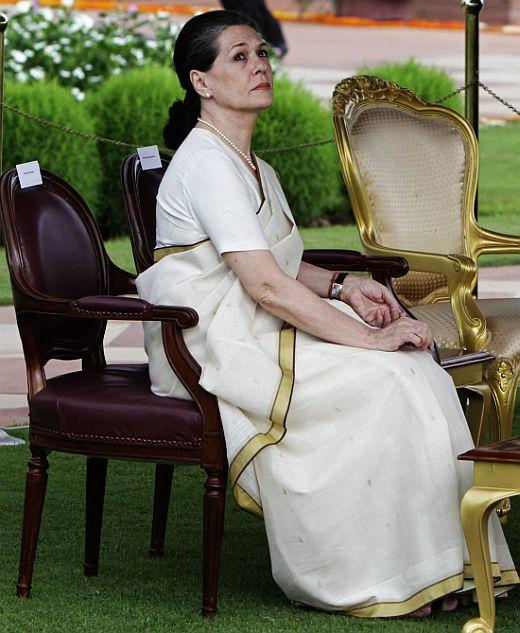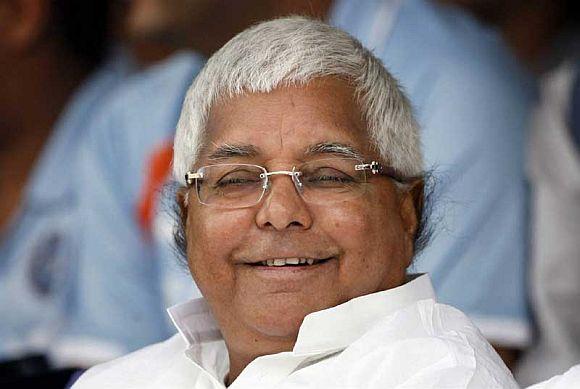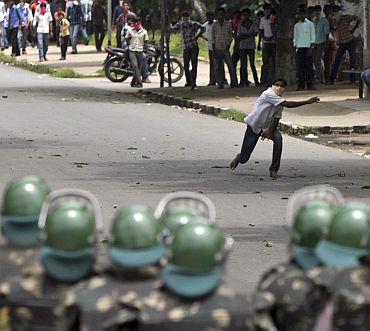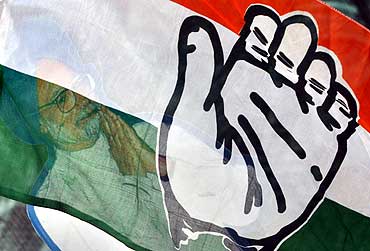
The Congress party's decsion to cut its losses and accept the Jharkhand Mukti Morcha’s hand of friendship shows its dire need for partners, says Anita Katyal
The decison of the Congress party to tie up with the Jharkhand Mukti Morcha for the formation of a coalition government in Jharkhand has again brought focus on the grand old party’s own deficiencies and its dire need for partners.
While Congress Vice-President Rahul Gandhi would like the party to go it alone in the elections, it has now been accepted that the Congress footprint has shrunk over the years and it has little option but to forge partnerships across different states.
Congress President Sonia Gandhi’s decision to set up a special committee last year on alliances under the chairmanship of Defence Minister A K Antony was a clear indication that the party is well aware of its shortcomings.
The Congress has negligible presence in Uttar Pradesh, Bihar, West Bengal and Tamil Nadu accounting for over 200 Lok Sabha seats. The Congress has an alliance with the Nationalist Congress Party in Maharashtra and the National Conference in Jammu and Kashmir. It has necessarily to continue with these partnerships despite the tensions between the state units of the two parties, as the Congress can ill-afford to go solo in these states.
...

While there is no doubt that the Congress alliance with the NCP and the NC is going to continue, the party will have to scout for partners in other states where it is precariously placed.
While Rahul Gandhi has made it known that the Congress will not have a tie-up with any regional outfit in Uttar Pradesh, the party will have to choose between Nitish Kumar’s Janata Dal-United and Lalu Prasad Yadav’s Rashtriya Janata Dal.
The alliance is expected to fructify closer to the Lok Sabha polls as the Congress will assess the relative strengths and weaknesses of the JD-U and the RJD in the coming months. It is not clear whether Bihar Chief Minister Nitish Kumar will improve his position after his break-up with the BJP. Similarly, it is still early to say whether Lalu Prasad Yadav’s party is on the revival path. Besides, the RJD chief could be in serious trouble if he is indicted in the fodder scam by a Ranchi court which is expected to deliver its judgement on July 15.
Although relations between the Dravida Munnetra Kazhagam and the Congress came under strain on the Sri Lankan tamils issue, the two parties are in the process of renewing their old friendship. The possibility of an electoral alliance between the two has brightened after the Congress supported DMK chief M Karunanidhi’s daughter Kanimozi in the recent Rajya Sabha elections.
...

The Congress has to get its act together in Andhra Pradesh which had contributed 33 Lok Sabha seats to the UPA kitty in the 2009 elections. The Congress has, however, lost ground in this state after late Y S Rajasekhar Reddy’s son Jaganmohan Reddy formed his own party. While Jagan has proved to be a draw in the Rayalseema and coastal regions, the Telangana Rashtriya Samiti is proving to be a tough rival in the Telangana region as the chief votary of a separate state.
The TRS has offered to tie-up with the Congress if the Centre agrees to its demand for a separate Telangana. The Centre has to take a call on this issue or else it will be wiped out in the region. At the same time, the party will have to align with Jaganmohan’s YSR Congress if it is to hold its own in the other regions of Andhra Pradesh. The possibility of such a tie-up is not ruled out.
Clearly, All India Congress Committee general secretary Digvijaya Singh, who was recently given charge of Andhra Pradesh, has his task cut out for him.
While the Antony committee’s work will pick up pace in the run-up to the 2014 Lok Sabha elections, it took the first decisive step towards the expansion of the UPA when it finalised the deal with the JMM at a late meeting on Tuesday night.
...

The Congress top brass was initially wary of a tie-up with the JMM as there are cases pending against its leaders. Moreover, the Congress had come in for severe criticism when it supported a Madhu Koda-led government which was embroiled in corruption cases.
While the Congress dithered, Shibu Soren’s JMM persisted with its efforts to form an alternative government with the Congress. The state was placed under President’s rule after the JMM broke up with the BJP in January. With 18 months left for the current assembly’s term to end, Congress MLAs were also pressurising the party leadership to form an alternative government in partnership with the Congress. Despite its initial reservations, the party was forced to relent when it was faced with erosion in its ranks.
There were reports that its party workers, legislators and even former MPs were planning to jump ship. They were apparently in touch with Babulal Marandi-led Jharkhand Vikas Morcha, which had an alliance with the Congress in the 2009 Lok Sabha elections. The JVM severed its ties with the Congress-led UPA government earlier this year on the Foregin Direct Investment issue.
Realising that its already negligible presence in the state would be further diminished, the Congress decided to cut its losses and accept JMM’s hand of friendship. While accepting the JMM as its senior partner in Jharkhand, the Congress decided instead to drive a hard bargain with the regional party for next year’s general election.
Consequently, the Congress has agreed to the appointment of Shibhu Soren’s son Hemant Soren as the next chief minister and in exchange it has asked for a substantial share of the 14 Lok Sabha seats.
Past experience shows that the partenrship with the JMM had proved fruitful for the Congress. When the two parties contested the 2004 Lok Sabha election in allaince, the Congress won six and the JMM four seats. However, when they went their separate ways in 2009, the Congress managed to win only one seat while the JMM bagged two seats.
...